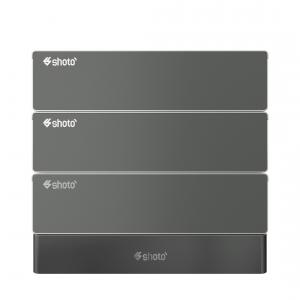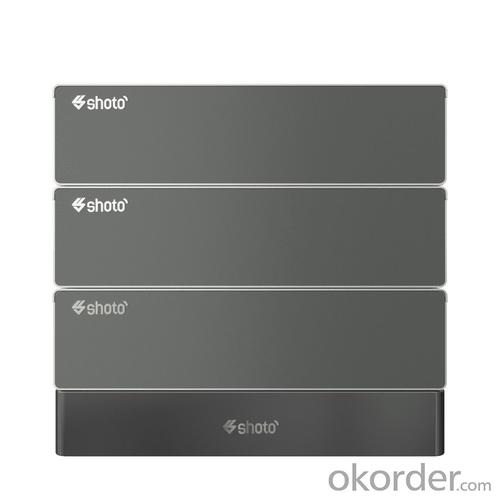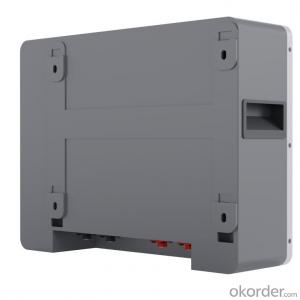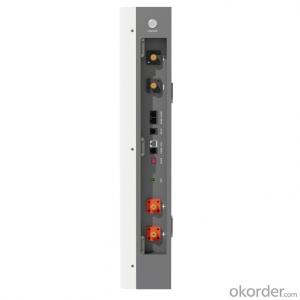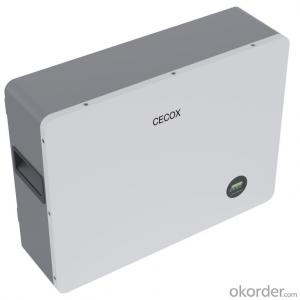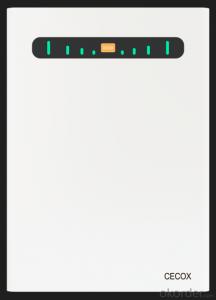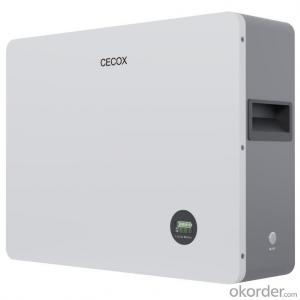Maui Solar Energy Systems Maui Shoto LifePO4 Battery Cells Wall Mount Power Rack 48V 200Ah 10.2kWH 6000Cycles Li-ion Battery
- Loading Port:
- SHANGHAI
- Payment Terms:
- TT OR LC
- Min Order Qty:
- 50 set
- Supply Capability:
- 5000 set/month
OKorder Service Pledge
Quality Product, Order Online Tracking, Timely Delivery
OKorder Financial Service
Credit Rating, Credit Services, Credit Purchasing
You Might Also Like
Specification
Application:
Home
Output Voltage (V):
51.2v
Work Time (h):
8 hours
Introduction:
Solar energy preferably used by domestic appliances, and additional Energy is stored in battery.
During the day, when battery is fully charged, the additional energy produced by solar can be sold and fed into the public .
At evening, the energy stored in the battery supplies electriciity to the domestic appliances.
At night, when the energy stored in the battery is depleted, the public grid supplies energy to the domestic appliances.
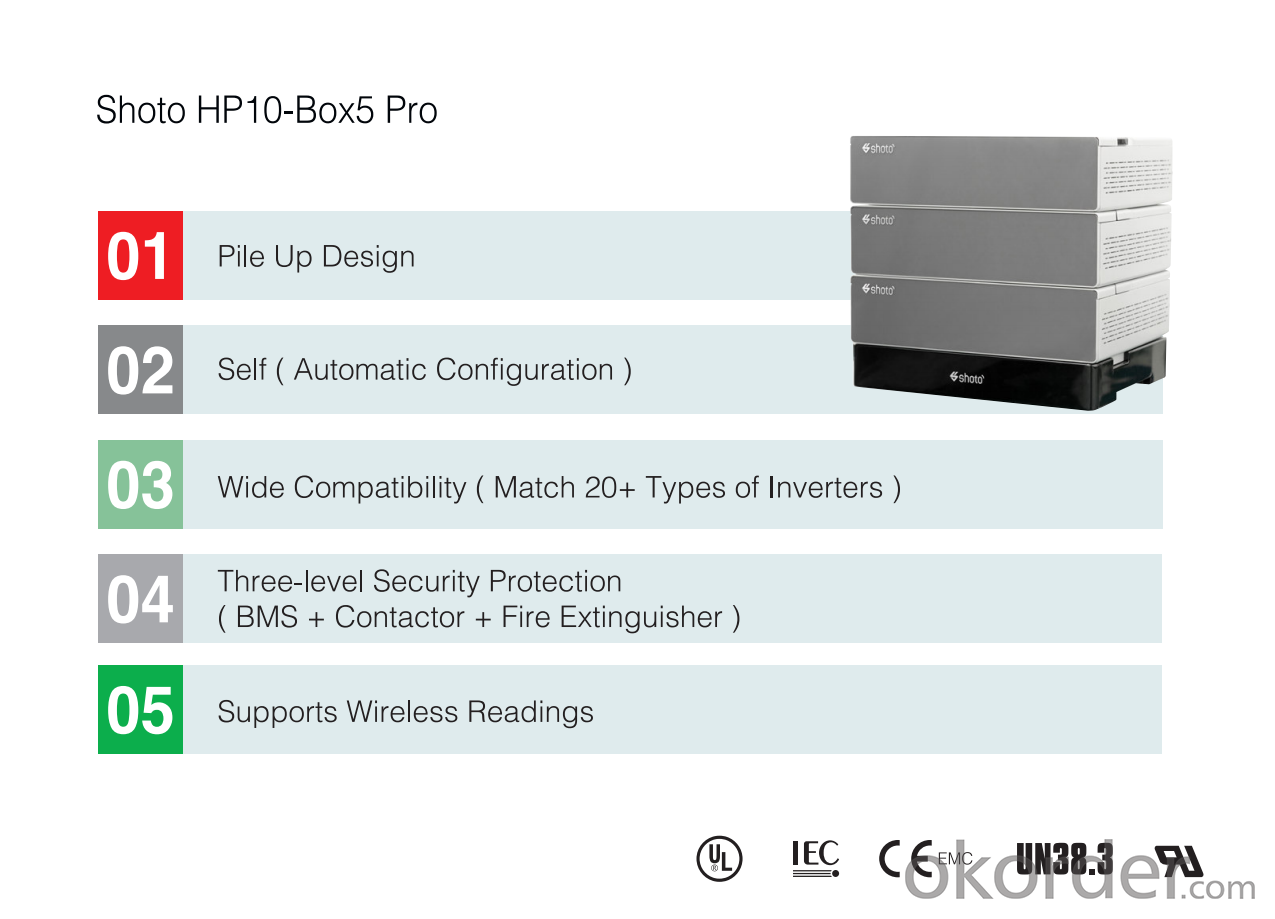
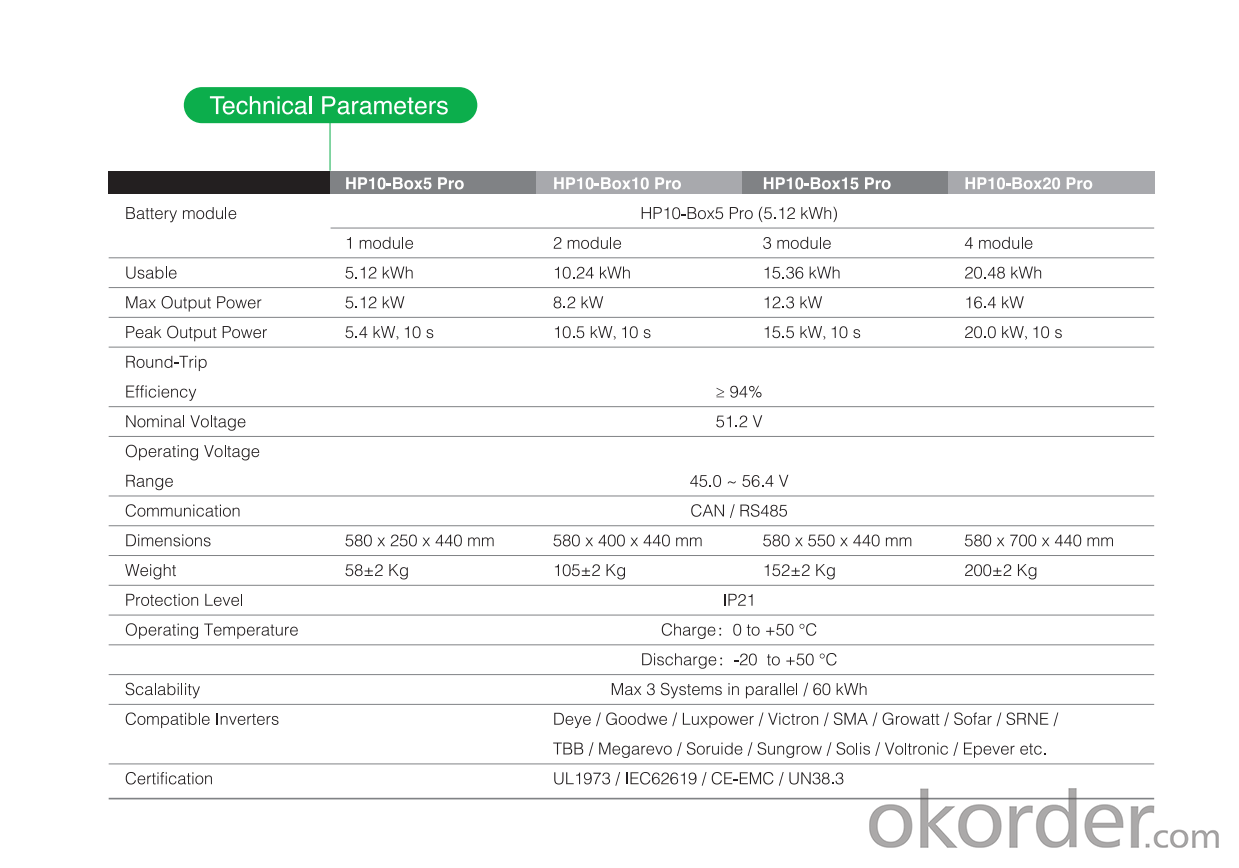
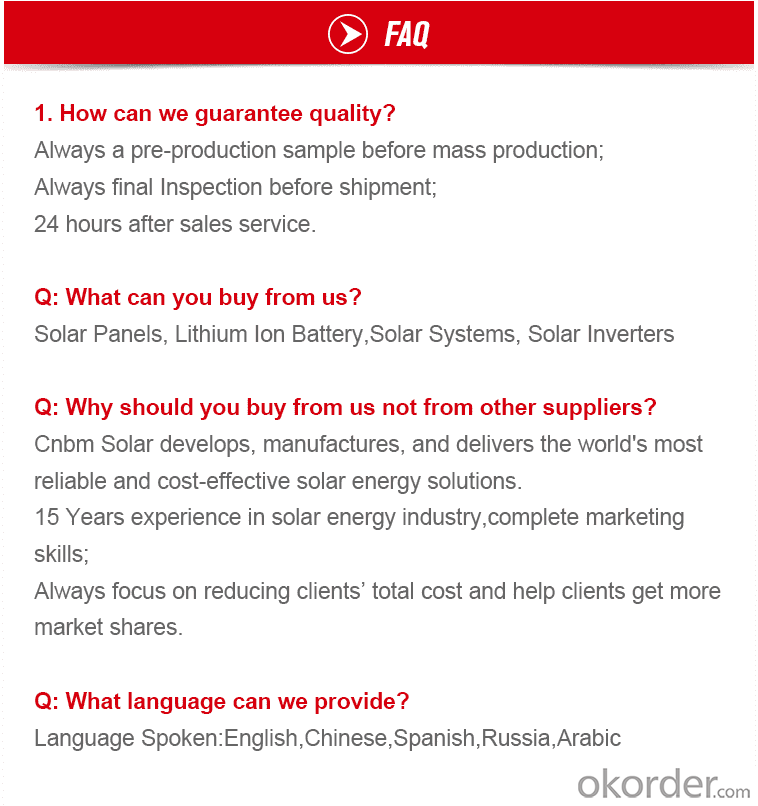
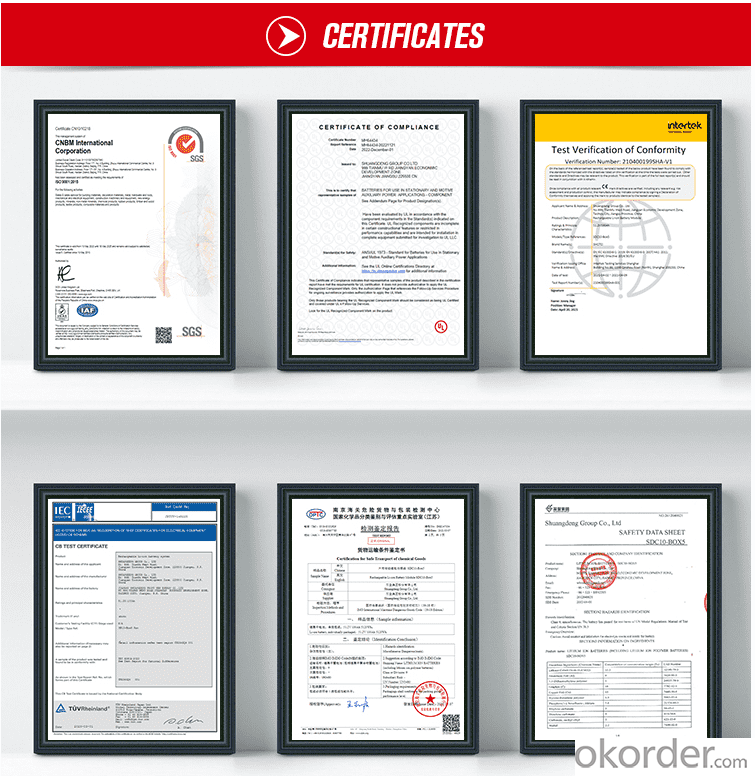
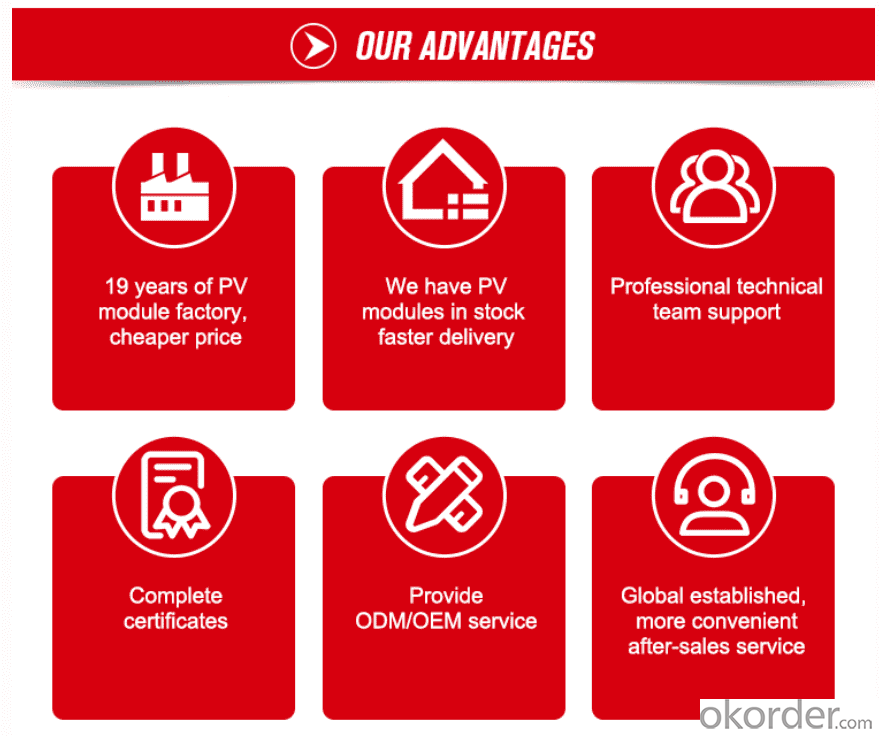


- Q: Can solar energy systems be used in areas with limited space for ground-mounted installations?
- Yes, solar energy systems can still be used in areas with limited space for ground-mounted installations. In such cases, alternative mounting options can be utilized, such as roof-mounted solar panels or vertical solar panel installations. Roof-mounted solar panels are a popular solution for homes and buildings with limited ground space, as they utilize the available roof area to capture sunlight and convert it into electricity. Additionally, vertical solar panel installations, where solar panels are mounted vertically on walls or other structures, can also be implemented in areas where ground space is limited. These vertical installations allow for solar energy generation in tight spaces or even on building facades. Therefore, even in areas with limited space for ground-mounted installations, solar energy systems can still be effectively utilized through alternative mounting options.
- Q: Can solar energy systems be used in areas with limited water supply?
- Yes, solar energy systems can be used in areas with limited water supply. Solar energy systems, such as photovoltaic panels, do not require water for their operation. They generate electricity directly from sunlight, making them suitable for use in regions where water scarcity is a concern. Additionally, solar thermal systems, which use sunlight to heat water, can be designed to minimize water consumption by utilizing closed-loop systems or alternative cooling methods.
- Q: What is a solar inverter and why is it necessary?
- A solar inverter is an electronic device that converts the direct current (DC) electricity generated by solar panels into alternating current (AC) electricity, which is used to power our homes and businesses. It is necessary because most of our electrical appliances and grid systems operate on AC power, while solar panels produce DC power. The solar inverter bridges this gap by ensuring the compatibility and usability of the solar energy, enabling us to utilize the power generated by solar panels efficiently and effectively.
- Q: Can solar energy systems be used in powering religious institutions like churches or temples?
- Certainly, churches or temples can utilize solar energy systems to power their operations. These buildings are particularly suitable for solar power due to their spacious roofs that can accommodate solar panels. By installing these systems, religious institutions can significantly decrease their electricity expenses, save money, and become more sustainable. Sunlight is converted into usable energy by solar panels, which can then be employed to fulfill the religious institution's lighting, heating, cooling, and other electrical requirements. Recent advancements in solar technology have made it possible to store surplus energy in batteries, ensuring uninterrupted power even on cloudy days or during the night. The usage of solar energy not only reduces the operational costs of religious institutions but also aids in reducing their carbon footprint. By minimizing reliance on fossil fuels, solar power systems contribute to mitigating climate change and advocating for environmental stewardship. This resonates with the core principles of numerous religious organizations that emphasize the significance of environmental sustainability and responsible Earth stewardship. Moreover, solar energy systems can serve as visible demonstrations of the religious institution's dedication to sustainable practices, inspiring both members and the wider community to adopt renewable energy solutions. By embracing solar power, religious institutions can showcase their commitment to caring for the planet and encourage others to do the same. To summarize, solar energy systems can effectively power religious institutions such as churches or temples. They present an eco-friendly and economical solution that aligns with the values of many religious organizations. By embracing solar power, these institutions can reduce their energy costs, promote sustainability, and inspire their members and the community to embrace clean energy solutions.
- Q: Can solar energy systems be used for heating swimming pools?
- Yes, solar energy systems can be used for heating swimming pools. Solar pool heating systems use energy from the sun to heat the water in the pool, reducing the need for conventional heating methods and saving energy costs.
- Q: Can a solar energy system be installed on a building with a clay tile roof?
- Yes, a solar energy system can be installed on a building with a clay tile roof. Special mounting systems are available that allow solar panels to be securely attached to clay tile roofs without damaging the tiles. It is important to hire experienced professionals who are familiar with installing solar systems on clay tile roofs to ensure a proper and safe installation.
- Q: Can solar energy systems be used in areas with limited space?
- Yes, solar energy systems can be used in areas with limited space. With advancements in solar technology, there are various compact and flexible solar panels available that can be easily installed in small spaces such as rooftops, balconies, or even on walls. Additionally, solar energy systems can also be integrated into existing structures, like windows or building facades, to maximize space utilization.
- Q: Can solar energy systems be used for powering electric vehicle rental services?
- Yes, solar energy systems can certainly be used for powering electric vehicle rental services. Solar panels can be installed on the roofs of rental service facilities or parking lots to generate electricity from the sun's rays. This electricity can then be used to charge the batteries of the electric vehicles, making them ready for rental at any time. By utilizing solar energy, rental services can reduce their reliance on the grid and decrease their carbon footprint. Additionally, solar-powered charging stations can be set up at various locations to provide convenient and sustainable charging options for customers. Overall, integrating solar energy systems into electric vehicle rental services not only promotes renewable energy usage but also enhances the eco-friendliness and sustainability of the transportation sector.
- Q: Can solar energy systems be used in areas with limited access to solar monitoring systems?
- Yes, solar energy systems can still be used in areas with limited access to solar monitoring systems. While solar monitoring systems can provide valuable data and insights for optimizing the performance of solar energy systems, they are not essential for the basic functionality of the systems. Solar panels can still generate electricity from sunlight even without monitoring systems. However, without access to solar monitoring systems, it may be more challenging to track and assess the performance, diagnose issues, and monitor the overall efficiency of the solar energy systems.
- Q: How do solar energy systems impact energy independence?
- Solar energy systems can greatly contribute to energy independence by reducing reliance on fossil fuels and the traditional energy grid. By harnessing the power of the sun, individuals and communities can generate their own clean and renewable energy. This reduces the need to import energy from other sources and helps to decrease dependence on centralized power systems. Solar energy systems provide a sustainable and decentralized alternative, empowering individuals and communities to take control of their energy production and reduce their carbon footprint.
Send your message to us
Maui Solar Energy Systems Maui Shoto LifePO4 Battery Cells Wall Mount Power Rack 48V 200Ah 10.2kWH 6000Cycles Li-ion Battery
- Loading Port:
- SHANGHAI
- Payment Terms:
- TT OR LC
- Min Order Qty:
- 50 set
- Supply Capability:
- 5000 set/month
OKorder Service Pledge
Quality Product, Order Online Tracking, Timely Delivery
OKorder Financial Service
Credit Rating, Credit Services, Credit Purchasing
Similar products
Hot products
Hot Searches
Related keywords
